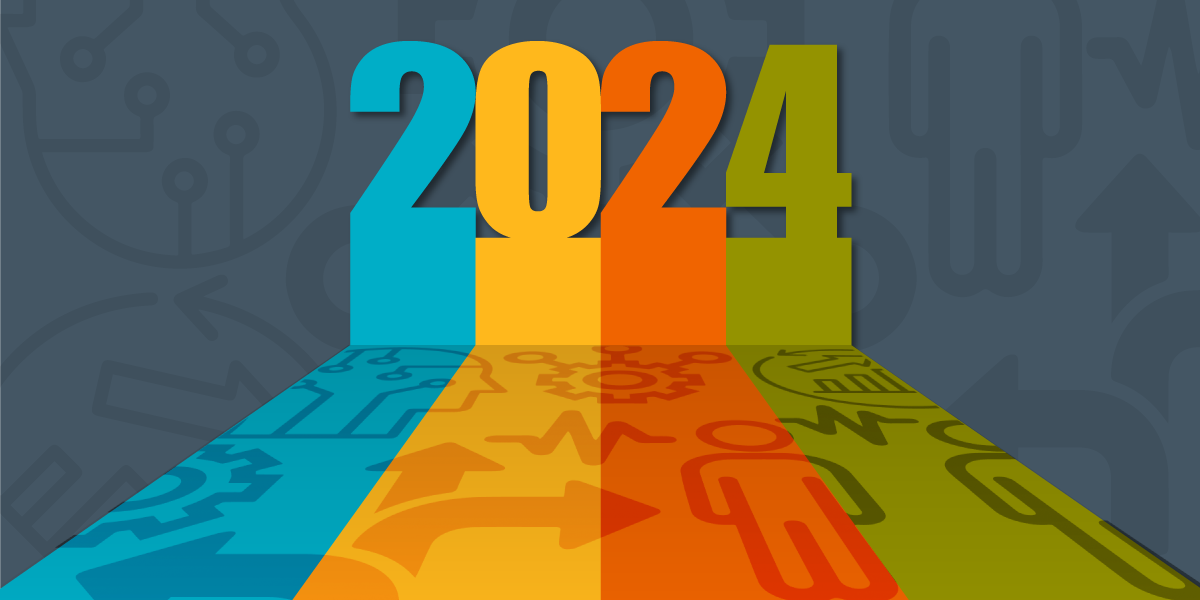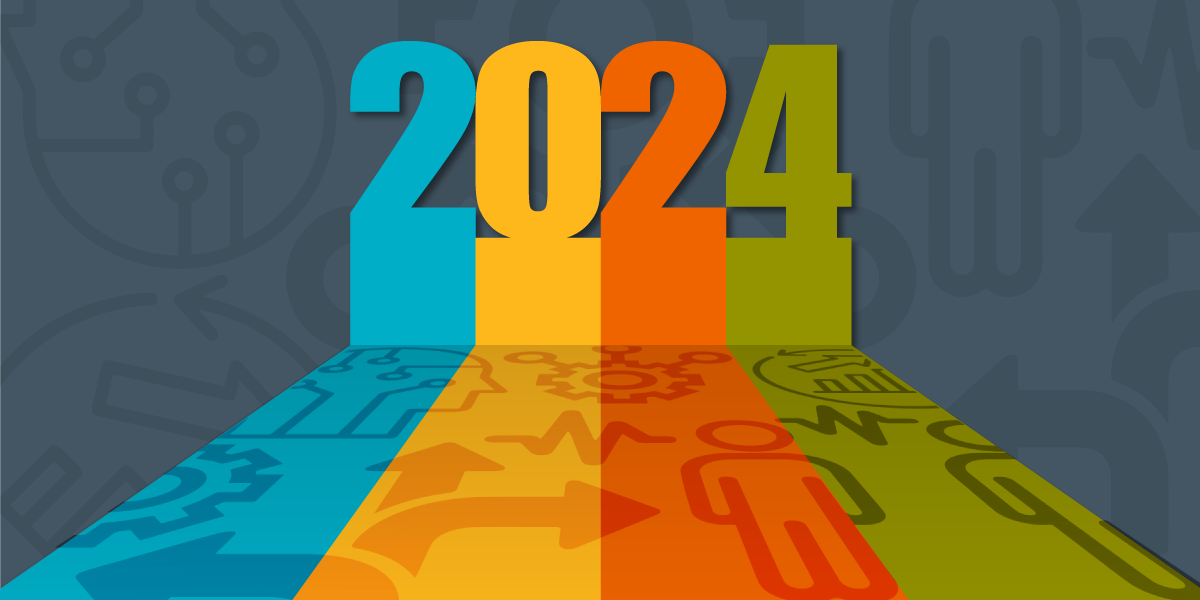For the past nine years, we’ve analyzed content from 20 top influencers on social media to explore trending leadership topics. Based on our most recent analysis, the hot leadership topics for 2024 mark a significant change in how people report and think about work.
For the first year ever, the two letters that topped the list of all the words and phrases used by influencers were not HR but AI.
This may suggest that AI surpasses HR in media attention in 2024, but the role of Human Resources (HR) has never been more critical. After all, the primary goal of HR is to ensure that the organization can attain success through its people.
What Leadership Topics Should Be on Your Mind?
As we look to the year ahead, organizations will rely more heavily than ever on their people. And HR is the only function positioned and equipped to ensure their success. They do so by preparing leaders and employees who can meet the challenges of AI and these hot leadership topics.
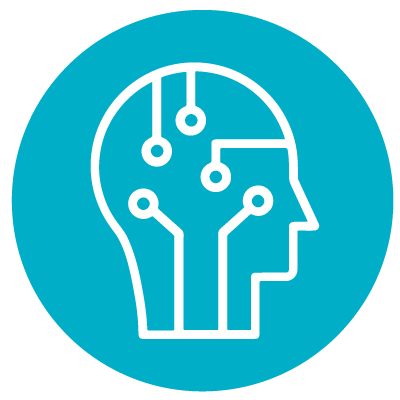
1. AI Inspires New Leadership Intelligence
We’ve undoubtedly entered an era where AI will dominate work. The rapid adoption of ChatGPT in 2023 signaled just how quickly people would get comfortable talking and working with generative AI.
Against this rapid takeoff, potential intellectual property and legal risks have given many leaders and companies reason to pause. AI is still unfamiliar territory and will require ongoing risk management and security. However, with the current lack of overarching governance and standards, leaders have needed to step up in new ways to fill this gap.
A new kind of leadership intelligence is needed to meet the ongoing AI challenge and opportunity. Leaders must continuously learn and stay informed about AI advances to function as stewards, not sheriffs, of AI at work.
For most leaders, AI isn’t going to disrupt or overhaul their role overnight. Instead, it will require a gradual increase in the frequency of setting and communicating work standards for their teams. Leaders must address employee fears or anxieties around AI and show how AI complements their human skills. Leaders who can manage change will be able to perform best. They should also be able to provide a clear vision of how AI intersects with and enables their team’s work.
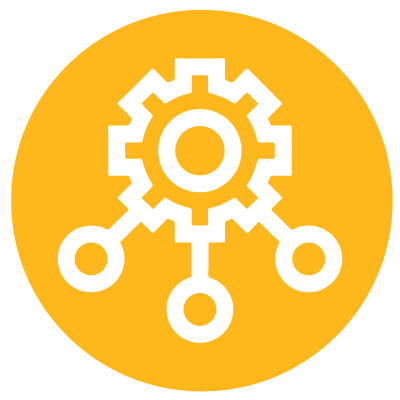
2. Skill Expansion Becomes the New Norm
With the rise of AI in the workplace, there has been increased value for uniquely human skills. HR is key in identifying and addressing critical skill gaps across their organizations. And in a business environment defined by change and AI advancement, the leadership skills that are in demand will continue to evolve.
What’s required now is not quite “reskilling” or “upskilling.” As commonly as those terms get tossed around, they don’t encompass the real change happening. Leaders don’t need to reskill and abandon their acquired skill sets. Nor do they only need to upskill what they have.
The skills required to lead are expanding, positioning HR to provide increased value for all learners and leaders. AI will be a disruptor, but leaders will certainly not be replaced by AI, nor will their employees. However, leaders who don’t keep up with AI and continuously expand their skills will be more likely to be replaced by leaders who do.

3. Redesigning Work for Continuous Learning and Adaptation
As organizations begin thinking differently about skills required for successful leadership in an AI-driven future, influencers call out the broader need for continuous learning and adaptation.
AI’s advancement at work will not only impact day-to-day tasks but also reshape how organizations are built and operate. Many HR teams we’ve spoken with recently are grappling with this. They’re asking, “How can we better structure our organization to learn and adapt quickly?”
Of course, the complete answer to this question depends upon the business’s unique drivers and goals, but many common elements will drive future success. Accessibility tops the list. Organizations must identify and then break down cross-functional barriers, providing quality tools that make it easy for teams to connect and access data, knowledge, and information. Leaders will continue to play the crucial role of modeling and fostering a continuous learning and adaptation culture.

4. Retaining Future Generations Requires Flexibility
Retention, a critical HR outcome, consistently emerges in a high volume of social mentions each year. But in a significant change this year, influencers called out how important flexibility has become as a retention driver, particularly amidst the push to return to office (RTO).
Employee perceptions of inflexibility not only impact retention but also senior leaders’ credibility. Our latest Global Leadership Forecast research showed trust in senior leaders was nearly 5X higher when flexible work was available and supported. Additionally, we found that CEOs who support flexibility were 3.3X more likely to feel prepared for talent retention and recruitment.
Providing flexible work options will continue to be a key strategy for retaining talent and improving perceptions of leadership throughout the organization.
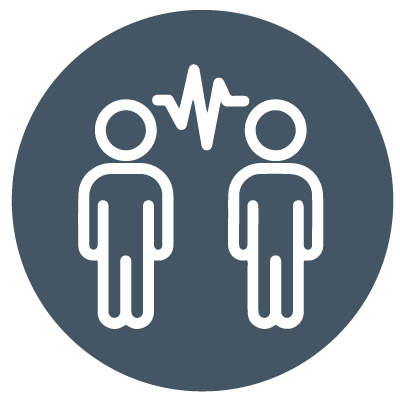
5. Human Connection Defines Company Culture
Last year, companies struggled to create positive work cultures amidst many post-pandemic challenges. As work has become more remote, hybrid, and dispersed, connection has become a defining component.
Two-thirds of workers report feeling disconnected from their colleagues, according to The Society for Human Resources Management (SHRM).
Leaders can help foster stronger connections with their teams, but this is also an opportunity for HR to help them create more connections through learning and mentoring.
Bringing people together to learn in cohorts helps to inspire a culture of learning and increase connection. In our latest Global Leadership Forecast, 76% of leaders reported making meaningful connections with their peers through cohort learning.
What Do These Hot Leadership Topics Mean for the Future of Work?
How will companies leverage these hot leadership topics to improve work outcomes in the year ahead? As we predicted during the last peak of AI development, successful leaders and businesses will reckon with both artificial and genuine challenges, striking a balance between AI and human impact.
Leaders are already discovering that they need to develop new skills within the ever-changing landscape of Gen AI. Ongoing learning and adaptation will be required to drive successful outcomes with AI at work. The time is now for HR to seize the opportunity and shape how leaders meet the challenges ahead.
20 leadership and HR social influencers who posted content used in our topic analysis:
| Adam Grant | @AdamMGrant |
| Brigette Hyacinth | @BrigetteHRM |
| David Green | @david_green_uk |
| Ester Martinez | @Ester_Matters |
| Gautam Ghosh | @GautamGhosh |
| Gordon Tredgold | @GordonTredgold |
| Jacob Morgan | @jacobm |
| Jane Bozarth | @JaneBozarth |
| Jeanne Meister | @jcmeister |
| Jim Stroud | @jimstroud |
| Johnny C Taylor Jr | @JohnnyCTaylorJr |
| Lewis Garrad | @LewisGarrad |
| Meghan Biro | @meghanmbiro |
| Sharlyn Lauby | @sharlyn_lauby |
| Simon Sinek | @simonsinek |
| Stacy Donovan Zapar | @StacyZapar |
| Steve Boese | @SteveBoese |
| Tim Sackett | @TimSackett |
| Trish Steed | @TrishMcFarlane |
| William Tincup | @williamtincup |
Explore DDI’s leadership trends research.
Stephanie Neal is director of the Center for Analytics and Behavioral Research (CABER). She leads market and trend research focused on leadership and business innovation and is the general manager and lead author of DDI's Global Leadership Forecast.
Topics covered in this blog
